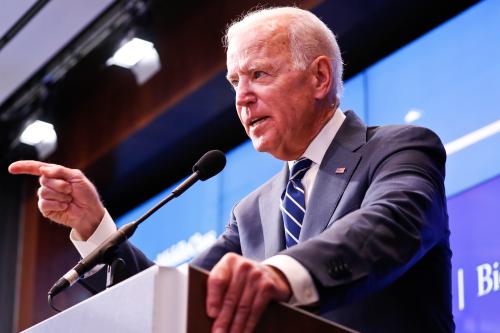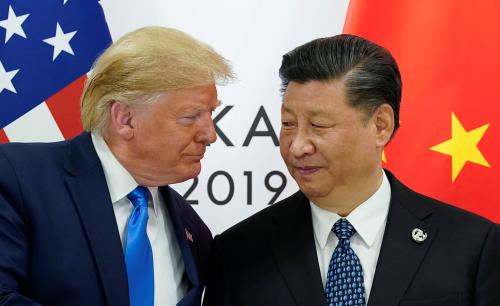Biden’s best chance of securing cooperation with China is not to compromise U.S. interests and values, but to work with like-minded democracies to negotiate collectively with Beijing from a position of strength. This tactic will no doubt be difficult, but Xi’s actions mean that it is growing more important with every passing month, argues Thomas Wright. This piece originally appeared in The Atlantic.
In a recent campaign ad, Joe Biden accused the president of being too soft on China over COVID-19. This decision to criticize Donald Trump on China and subsequent signals that Biden will take a tough approach toward Beijing have made some progressives nervous.
Writing in The Atlantic, Peter Beinart called Biden’s ad “a jingoistic fantasy” that may put Asian Americans in the crosshairs of racist attacks, “hastening a geopolitical confrontation that threatens progressive goals.” In The New York Times, the Quincy Institute for Responsible Statecraft scholars Rachel Esplin Odell and Stephen Wertheim warned Biden about following Trump into a new cold war with China and argued that the United States should seek to work with Beijing on shared challenges such as pandemics and climate change.
Critics of Biden’s China policy are proposing far-reaching U.S.-China cooperation that Chinese President Xi Jinping’s recent diplomatic record suggests is chimerical at best. Yes, the United States should have a bilateral relationship with China and the two countries should cooperate on shared interests, including pandemics, but the proposition that a cooperative world lies just beyond the horizon if only the United States were to want it enough is not borne out by the evidence. And any progressive foreign policy needs to be based on a realistic assessment of China’s record.
Just ask the Europeans. Their experience proves that such cooperation has real limits and that China is constantly looking to exploit any perceived weakness or division. The European Union has no meaningful ability to counter Chinese power militarily. It is diplomatically cautious and hardwired to support engagement with Beijing. Its strategic assessments go out of their way to be nuanced and balanced. Last year, a key EU document said:
China is, simultaneously, in different policy areas, a cooperation partner with whom the EU has closely aligned objectives, a negotiating partner with whom the EU needs to find a balance of interests, an economic competitor in the pursuit of technological leadership, and a systemic rival promoting alternative models of governance.
Although this may sound as if the EU is trying to have it all ways with China, this wording was widely interpreted as a toughening of Europe’s position.
Even as the EU tried to formulate a united approach to protect against pressure from Beijing, it sought to distinguish itself from the United States with an ambitious and pragmatic policy agenda for cooperation with China. This year was supposed to see the first ever summit, in Leipzig, Germany, among the heads of government of all 27 EU member states and President Xi, with negotiations on a comprehensive EU-China investment agreement at its heart. When the coronavirus hit in January, the EU quietly assisted China and refrained from any criticism of its regime, in the hopes that doing so would build goodwill.
In other words, the official EU posture and the bloc’s practical policy toward China, even as it hardened, was far softer and more benign than any imaginable U.S. approach. European governments were going to great lengths to see if engagement would yield new levels of cooperation on shared challenges, but they were continuously and sorely disappointed.
Well before the COVID-19 crisis, EU governments were growing more and more worried about China’s behavior. They realized that while Chinese state-backed companies and funds aggressively increased their presence in Europe, China would not undertake structural economic reform to open up to Europe. Beijing sought to divide the EU, developing ties with Central and Eastern Europe while pressuring recipients of Chinese investment, such as Greece and Hungary, to block or stymie EU actions Beijing disapproved of on human-rights or investment controls. China also began to flex its muscles to mute any criticism of the regime by governments, companies, or individuals. For instance, the Chinese broadcaster CCTV refused to air an English Premier League soccer match after an Arsenal player, Mesut Özil, spoke out against detention camps in Xinjiang. When Swedish PEN awarded a freedom-of-speech prize to the Chinese-born and Hong Kong–based Swedish citizen Gui Minhai, the Chinese embassy in Stockholm fiercely denounced it and warned that Sweden would “suffer the consequences.” These were not isolated incidents, and they gradually began to change European attitudes.
As Andrew Small, a scholar with the German Marshall Fund and European Council on Foreign Relations, shows in a new paper on EU-China relations, Beijing further escalated these exploitation efforts once China could turn its attention away from the coronavirus. China sought to take economic advantage of Europe’s vulnerability during the pandemic by trying to buy European technology companies. Chinese ambassadors—nicknamed Wolf Warrior diplomats, after the nationalistic action movie—went on the offensive, accusing the French government of letting its elderly citizens die in nursing homes and of spreading the falsehood that the U.S. Army had brought the virus to China. German officials complained that China was insisting on public declarations of support in exchange for its assistance. The Chinese foreign ministry demanded that the state-owned China Daily delete a sentence on the origins of the coronavirus in an op-ed by EU ambassadors to China. Beijing also pressured Brussels to modify a report on disinformation to make it less critical of China.
China doesn’t strongarm just Europe. The Australian government recently proposed an impartial international investigation into the origins of the coronavirus to counter false narratives emanating from China and the United States. Beijing retaliated by threatening massive tariffs on Australian barley and banning imports of beef. The Canadian foreign minister was apparently so wary of antagonizing Beijing that he was unwilling to mention Taiwan, which China does not recognize as a country, by name when pressed by a member of Parliament to thank Taiwan for shipping masks to Canada during the pandemic.
As Small notes, Europeans now have real concerns that greater integration with China’s economy will create new vulnerabilities that Beijing will exploit. As a result, the EU is now reluctantly adopting a much tougher approach toward China diplomatically and economically. European governments are tightening investment controls to prevent the Chinese government from acquiring distressed assets during the recession. They are also more aware than ever before of the need to stay united to prevent China from pursuing a divide-and-conquer strategy.
Europeans are gradually understanding the direct challenge China poses to their liberal values. Under Xi, China’s system of government has become more dictatorial and totalitarian. Its mass repression of the Uighur population in Xinjiang is the largest internment of an ethnic or religious minority since World War II. It has broken its “one country, two systems” commitment to the people of Hong Kong. It is pioneering new technologies that will strengthen autocrats around the world. Its Belt and Road Initiative has weakened international standards on preventing corruption and it is actively trying to undermine global rules and norms on human rights.
The question that Biden’s progressive critics must answer is: What has Europe done wrong? Why has the EU’s willingness to engage not been reciprocated? After all, this should be a golden opportunity for China to isolate the United States by working with the EU to discredit the Trump administration’s arguments. The only plausible answer is that China is either not willing or not able to deliver the type of cooperation the EU is proposing and Biden’s critics say they want.
Many progressives know this. Indeed, Biden’s critics might just be in a minority in the progressive foreign-policy community. Remember that Elizabeth Warren and Bernie Sanders put the struggle against global autocracy and corruption at the heart of their foreign policies. They were skeptical of escalating security competition with Beijing, but they certainly saw China as a threat politically, economically, and on values of democracy and human rights. Warren’s policy adviser Ganesh Sitaraman, one of the leading authors on progressive foreign policy, has written about the China challenge as one of “nationalist oligarchy.” Progressives, he said, should “take seriously the risks that come from economic integration with” such a power.
Warren, Sanders, and most of their advisers also made a point of emphasizing their support for America’s democratic allies in Asia. This is another point of difference with the progressive critics who want to pull back from these alliances to secure cooperation from Beijing.
Beinart, for example, has previously written about the need for the United States to accept an enhanced Chinese sphere of influence in Asia, which would include pushing Taiwan to unify with the People’s Republic of China. Wertheim has argued that the United States should withdraw most of its forces from Asia and abandon primacy globally. It is certainly possible that China would make real concessions to the United States in exchange for a geopolitical capitulation of this magnitude, but it would have hugely destabilizing repercussions—likely whetting China’s appetite in Asia and undermining America’s allies.
The critics do have one valid point. Biden could do a better job of distinguishing between China’s government and the Chinese people. He should speak about the Chinese Communist Party regime and President Xi, rather than the Chinese. For liberals and progressives, a rising China is not the problem; the nature of its regime is.
Above all, though, the Democrats’ policy toward China should not just be about the United States and what happens inside Washington. It must be driven by a realistic and objective assessment of the Chinese government’s behavior internationally. That’s why the European example is important. This week brought another disturbing and significant illustration of Xi’s intentions. Beijing is pushing for a new security law in Hong Kong that would effectively end the “one country, two systems” model and remove the territory’s remaining freedom and autonomy. Last year, Trump gave Xi the green light to act as he wished in Hong Kong, before partially reversing himself under pressure. Of course Biden should call out Trump for this and look at ways of responding, such as imposing targeted sanctions or even revisiting Hong Kong’s special status under U.S. law. That’s not “out-hawking Trump”; it is pointing out a real difference between the two candidates and standing up for international law and human rights.
Biden’s best chance of securing cooperation with China is not to compromise U.S. interests and values, but to work with like-minded democracies to negotiate collectively with Beijing from a position of strength. This tactic will no doubt be difficult, but Xi’s actions mean that it is growing more important with every passing month.
The Brookings Institution is committed to quality, independence, and impact.
We are supported by a diverse array of funders. In line with our values and policies, each Brookings publication represents the sole views of its author(s).









Commentary
How should Biden handle China?
May 28, 2020